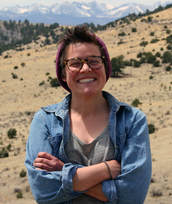|
I travel to a town called Dijon, like the mustard, to see a woman I have only known for eight hours. She smiles through the crinkles of her eyes and leans in to talk as if we share a formidable secret. Perhaps the secret is this: we are both vegetarians but have just eaten the traditional Hungarian beef Goulash. It tastes warm and familiar. I regret nothing.
I first meet her in a bed-bug infested hostel hidden down a dark alleyway in Budapest, where the streets are slick with misting rain and the locals drink extra shots of Palinka to chase away the cold. She speaks with a soft affectation, reportedly from years of performing Shakespeare in high school theater. This would mark her as pretentious but since she ties her hair back when she eats and smiles with spinach stuck between her teeth, she is endearing. She comes from Toronto, she bakes elaborate cheesecake for her father’s garden parties, and she is on vacation from teaching English to French teenagers. She does not say that she is lonely, but I know that she is—and by this, of course, I mean that I know that I am. We journey to a dingy Communist themed bar with bright pop art of Stalin adorning the wall, and presumably a drink board filled with clever puns, though they are all in Hungarian and so the best I can do is order water. We sit on stools that are too tall in the corner of the smoke-filled cave while the brooding cigarette-toting boys circle us like turkey vultures. But we do not look at them, much. We talk, we laugh, and I look her in the eyes and do not think about myself. I speak with uncharacteristic expression, I gesture broadly with my hands, and I believe that I am interesting. I feel the rush of adrenaline that comes hand in hand with the laser-like attention I must muster in order to be charming while struggling to remember my opinions of the twentieth century English classics. I decide that I am attracted to her. I consider the possibility that she is attracted to me. I am sweating profusely. We return to the hostel entryway and sit too close to each other on the stained red couches while the desk attendant snores. The faded yellow walls close in around us, suffocate us, we inch closer and pretend not to notice the bugs travelling along the cracks on the walls like cars seen from an airplane. It suddenly and slowly becomes four in the morning; she must catch her bus back home. I lie awake plagued by the possibility that she likes me, and the possibility that she does not. I do not know which would be worse. We hug when she leaves. We do not kiss. She tells me to visit her in the quaint French town named after the condiment. I tell her I will. I return to my bed and think about the length of our embrace: not long enough to determine with certainty that we have experienced more than a convivial night discussing Virginia Woolf. But where there is doubt, there is hope, and in this I shroud myself like a patchwork quilt on a windy evening spent stargazing.
*** I change my travel plans, I buy a ticket to Paris: I am on a bus and then a plane and then a train to a town named Dijon, like the mustard. I step off the train and forget which face I am searching for; all I can remember is the soft timbre of her voice, as if she is always afraid of waking someone. She calls my name; we embrace with intensity that declares we are either old friends or new lovers. Her rounded cheeks are flushed in the cold and her nose drips with a distinct lack of delicacy that gives me the strong impulse to hold her hand. |
Perhaps the secret is this: we are both vegetarians but have just eaten the traditional Hungarian beef Goulash. We walk the chilled, snow-frosted sidewalk while the boxy blue cars speed past us in the falling light. The streets are peppered with charming boulangeries and cozy restaurants lit only by the dancing glow of flickering candle flames. She chatters pleasantly, a trickling waterfall. I am sweating profusely.
We make a quiche with real French cream and leave it in the oven too long because we are busy comparing wounds from previous relationships. Mine: jagged and recent, hers: dissolvable stitches that should be gone in five to seven days. The quiche is burnt at the bottom but still tastes divine; everything tastes better in France. I am allowed to think this because I will only be in France for forty-eight hours. We sleep in the same bed, her bed, the bed she is renting temporarily from a wealthy twenty-seven year old named Marius. Her room is sparsely but poignantly decorated with polaroids of her people, and I long to be nestled in between their smiling faces. We lie side-by-side while we speak of the friends who have shaped us and the brothers we do not know. I rigidly adhere to the edge of the bed; every fiber of my being is conscious of the three and a half inches that separate me from her. I stare up at the ceiling. The words fall away; she rolls over to face me. When she sighs I feel a warm gust of air brush my neck. I am still sweating profusely. I try to breathe through my nose instead of my mouth, but then I can no longer breathe at all. I feel restless, coiled energy in my legs like a loaded spring but I do not dare to move. I have an itch on my cheek and I will die before I scratch it, I can hear her blinking, I think that she must want me to kiss her, I think that she can’t possibly want me to kiss her. The silence pulses between us, vibrating through the air in the frequency that bats, dolphins, and potential lovers all share. The seconds turn into minutes turn into hours and the opportunity is gone before I have even had the chance to master breathing without the accompanying ragged gasping. She snores softly next to me, the musty exhalation tickles my nose. I lie awake plagued by the possibility that she likes me, and the possibility that she does not. I do not know which would be worse. The next morning we eat whole yogurt and fresh fruit. She drinks tea and I make coffee without a coffeemaker, it is strong and bitter and filled with grounds. She chatters, I listen, and she leaves for work. I use my mangled high school French to buy her a miniature Christmas tree from the department store. I leave her a heartfelt note that nonetheless refuses to discuss the contents of my heart. I board the train and silently consider my nebulous motivations: lust and loneliness, desire and attraction, boredom and interest. We exchange a few emails laden with exclamation points and clunky attempts at witticisms. Then we stop. I think about her often, and then suddenly and slowly not at all. I give my mother three tiny vials of mustard at Christmas and she is tickled that it comes from a town named Dijon, like the mustard. |

Laura McGehee used to live in a normal city doing normal human things, but then she spent four months walking from Georgia to Maine. This was decidedly less normal. She currently lives and works at a remote wolf sanctuary in Colorado where she teaches visitors about the importance of keeping wild creatures wild. Her writing can be found scattered across the Web, in her mother's scrapbooks, and everywhere in between.
